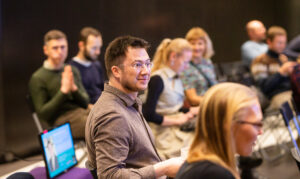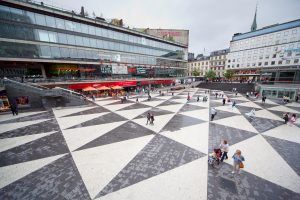Five Lessons for Civil Society Collaboration
Civil society plays an essential role in vibrant, democratic societies – adding value through symbiotic relationships with governments. This value is borne out in the research and data: when civil society is engaged, it leads to more ambitionAccording to OGP’s Articles of Governance, OGP commitments should “stretch government practice beyond its current baseline with respect to key areas of open government.” Ambition captures the po..., stronger policies and better results. Examples from OGP member countries’ action plans exemplify this. During a Democratic Freedoms Learning Network (DFLN) webinar, government and civil society leaders shared five important insights and lessons learned.
Long-term engagement
Oleksandr Yarema, the State Secretary of the Cabinet of Ministers of Ukraine, shared his experience of how long-term engagement with civil society paid off at a moment of crisis. Over the years, different Initiatives such as partnerships on key social issues, work on OGP action plans, and improvements in the use of open data, all contributed to ensuring a basis for a rapid crisis response. Wanjiru Gikonyo, an experienced Kenyan advocate for governance and accountability also pointed towards the long experience of civil society in Kenya stemming from before independence. While the relationship with the government has at times been fraught, both sides are able to draw strength from their respective contribution to Kenya’s emergence as a lower-middle income country and economic leader in the region.
Building trusted relations
Yarema also stressed that a trusted relationship between civil society and government is essential. Since Russia’s full scale invasion, civil society became a ‘second front’, playing an important role in humanitarian support, documentation and advocacy. This was only possible because of the trust built up over the years. As Ott Karulin – Government of Estonia and OGP co-chair – commented: “Don’t wait until you need civil society to invest – you have to start before.”
Structured spaces for engagement
In both Kenya and Ukraine the importance of structured spaces for engagement were seen as critical. This might be the involvement of civil society in government programmes or institutional support for self-organised structures. At the same time, it is key that structured spaces are complemented by less formal approaches to engagement. This element echoed the points emerging from an earlier DFLN discussion on building dialogue between civil society and government.
New tools for emerging challenges
Civil society and government need to regularly re-tool to address new challenges. For example, based on multiple indicators Kenya now scores well on transparencyAccording to OGP’s Articles of Governance, transparency occurs when “government-held information (including on activities and decisions) is open, comprehensive, timely, freely available to the pub... More and budget accountability – but corruption has morphed into new spaces. Civil society therefore needs the insight and analysis to identify these new challenges and to then develop new tools to tackle them.
Oversight and devolution
Devolved governance and the inclusionOGP participating governments are working to create governments that truly serve all people. Commitments in this area may address persons with disabilities, women and girls, lesbian, gay, bisexual, tr... More of oversight bodies in the Kenyan 2010 constitution has allowed for greater decision making and scrutiny at the local level. Further work is needed to ensure progress on social accountabilityTransparency of public service delivery is not enough on its own; giving citizens opportunities to monitor progress on the ground and hold their governments accountable improves the quality of these s... and for OGP to further devolve its work. It was clear that civic engagement can’t just be a tick-box exercise but requires true engagement, including at the local level.
These insights are echoed in recent research, notably the Skeptic’s Guide to Open Government and the new OECD report on the Protection and Promotion of Civic Space. In particular, the finding that there is an undeniable correlation between diminished civic space and adverse outcomes in a range of areas from health to public safety and the strength of democracy. It can take a few years for these negative impacts to surface, but they are clearly there.
No comments yet
Related Content

Democratic Freedoms Learning Network
Learn about the Democratic Freedoms Learning Network, an informal network of government reformers, civil society advocates, and international partners and others committed to reversing the 15-year trend of declining civic…

Four Steps to Build Dialogue Between Government and Civil Society
How can governments build a more constructive relationship with civil society? Get started with four steps outlined by OGP members at a recent Democratic Freedoms Learning Network here.

Civic Space
OGP members are working to uphold basic freedoms of expression, assembly, and association even as these human rights are under global attack.


Leave a Reply